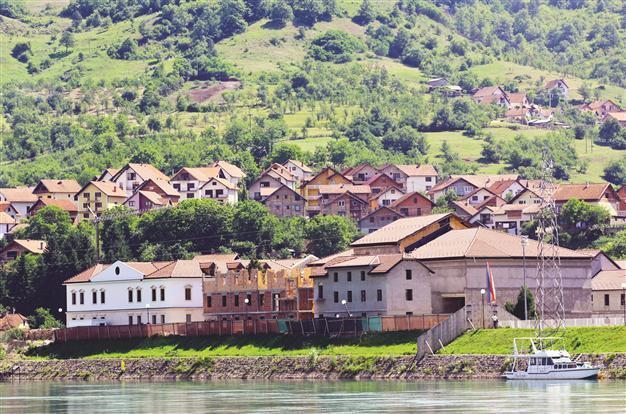Famous director's mini-town draws Bosniak ire
VISEGRAD, Bosnia - Anatolia News Agency

Some 11,000 square meters of the mini town ‘Andric Grad’ have already been completed. The town will include houses from the periods of the Ottoman and Austro-Hungarian empires and the Kingdom of Yugoslavia. AA photo
World-renowned Serbian director Emir Kusturica has been accused of cultural vandalism after stones from a historical castle were used in the construction of a mini-town called Andric Grad, a public-private project in which he is the biggest contributor.“Kusturica is involved [in the project] it to take revenge. He wants to take revenge against the Bosniak nation, of which he was a part in the past. It is ‘vandalism’ to build a new structure by damaging another piece of cultural heritage,” famous academic Bosniak academic Muhammed Filipovic said.
“Hundreds of years of historical structures should not be damaged. It is a crime to damage these structures and relevant organizations should take action. The main problem here is that the project is being realized with political aims,” said Professor Amir Pasic, an expert for UNESCO’s International Council on Monuments and Sites (ICOMOS) and the Islamic Cooperation Organization’s chief architect.
‘A political game’

The groundbreaking ceremony of the mini-town, which will include houses from the periods of the Ottoman and Austro-Hungarian empires and the Kingdom of Yugoslavia on an area of 14,000 square meters, was conducted on June 15, 2011, the 622nd anniversary of the Battle of Kosovo with the attendance of the prime minister of Bosnia’s Serbian entity, Milorad Dodik.
Kusturica is also purportedly planning to use Andric Grad for the shooting of a film that will reportedly show the Ottoman Empire in a bad light.
Some 11,000 square meters of the town have already been completed, but its construction has caused harsh reaction because some of the stones used in the construction were removed from Petrinia Castle, which was built in the Bosnian city of Trebinje during the Austro-Hungarian era. Bosniaks are against the construction of Andric Grad because it will spoil the image of Drina Bridge while Serbs have also criticized the project because of the use of historical stones in its construction.
Mini-town’s construction a ‘crime’
Pasic said it was a crime to remove stone from the historical Petrinia Castle and that the construction of such “imaginary towns” like Andric Grad was a tradition in Hollywood. “Any other structure should not be destroyed for the construction of such a town.”
Pasic said Bosnia Herzegovina had made a great effort to include the historical Drina Bridge on the UNESCO World Heritage List. “The state should take action. If Petrinia Castle is a national monument, the fact that it is being damaged for the construction of Andric Grad is a big problem.” Filipovic said the stone town being built in Visegrad was a kind of violence against the feelings, history and culture of thousands of people living in the city.
Kusturica, however, hit back at the accusation. Noting that Bosnian academics and scientists were free to express their ideas, he said: “Do they have a right to say that I am building a holocaust structure? How can a structure, which symbolizes multi-ethnic life in Bosnia, be identified with a holocaust?” he asked. But Filipovic said Bosniaks had been ethnically cleansed from Visegrad and even the traces of them in the city would be removed with the removal of monuments and historical structures there.
















